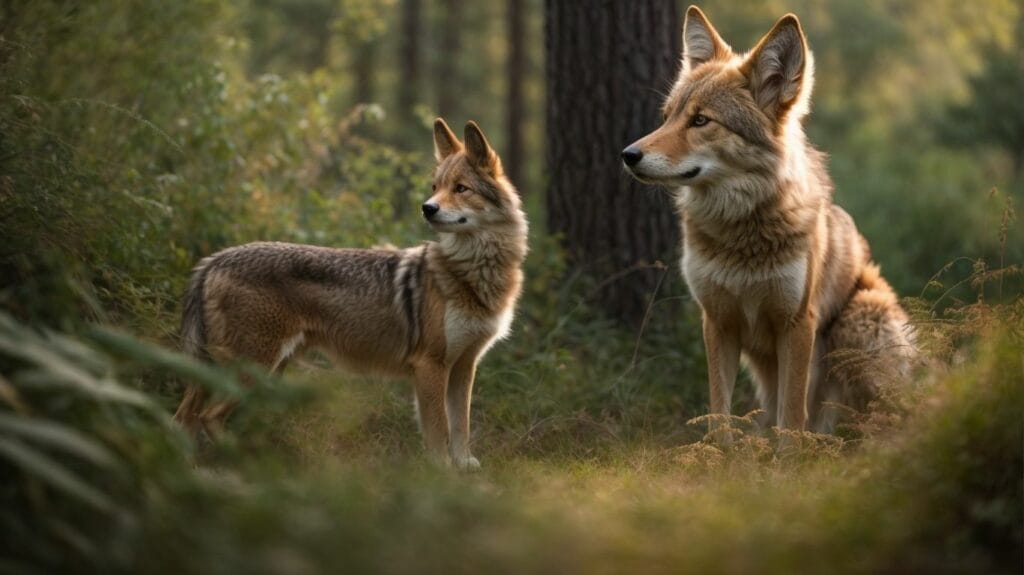Can Dogs and Coyotes Breed? This is a fascinating question that raises curiosity about interspecies hybridization. An interspecies hybrid is the offspring resulting from the mating of individuals from different species. In the case of dogs (Canis lupus familiaris) and coyotes (Canis latrans), they belong to the same genus, Canis, and share a common ancestry, which leads to the possibility of crossbreeding between them. Genetic compatibility plays a crucial role in successful hybridization. Dogs and coyotes have similar genetic makeup and share many genetic traits. However, they also have distinct differences in terms of appearance, behavior, and physiology. Understanding these similarities and differences is essential to evaluate their potential for crossbreeding. Reproductive compatibility is another important factor to consider. Dogs and coyotes have different mating behaviors and reproductive cycles. Dogs are known for their year-round reproductive ability, while coyotes have a specific mating season. These differences may impact the likelihood of successful breeding between them. Although rare, there have been documented cases of successful crossbreeding and hybridization between dogs and coyotes. These instances provide evidence that interbreeding can occur under certain circumstances. However, the possibility of dogs and coyotes breeding raises controversial and ethical concerns. Hybridization can result in the displacement of native species and alter ecosystems. The potential for hybrid offspring facing challenges in survival and adaptation is also a significant consideration. Exploring the topic of dogs and coyotes breeding encompasses an understanding of genetic and reproductive compatibility, as well as the ethical implications surrounding interspecies hybridization.
Key takeaways:Key takeaway:
- Interspecies hybridization between dogs and coyotes is possible: Dogs and coyotes are genetically compatible, allowing them to produce offspring through crossbreeding.
- Successful crossbreeding has been observed: There have been documented cases of dogs and coyotes successfully mating and producing hybrid offspring.
- Controversy and ethical concerns surround interbreeding: The impact on canine behavior and domestication, guardianship potential and temperament, as well as conservation and indigenous perspectives, raise ethical concerns and controversies surrounding interbreeding between dogs and coyotes.
Can Dogs and Coyotes Breed?
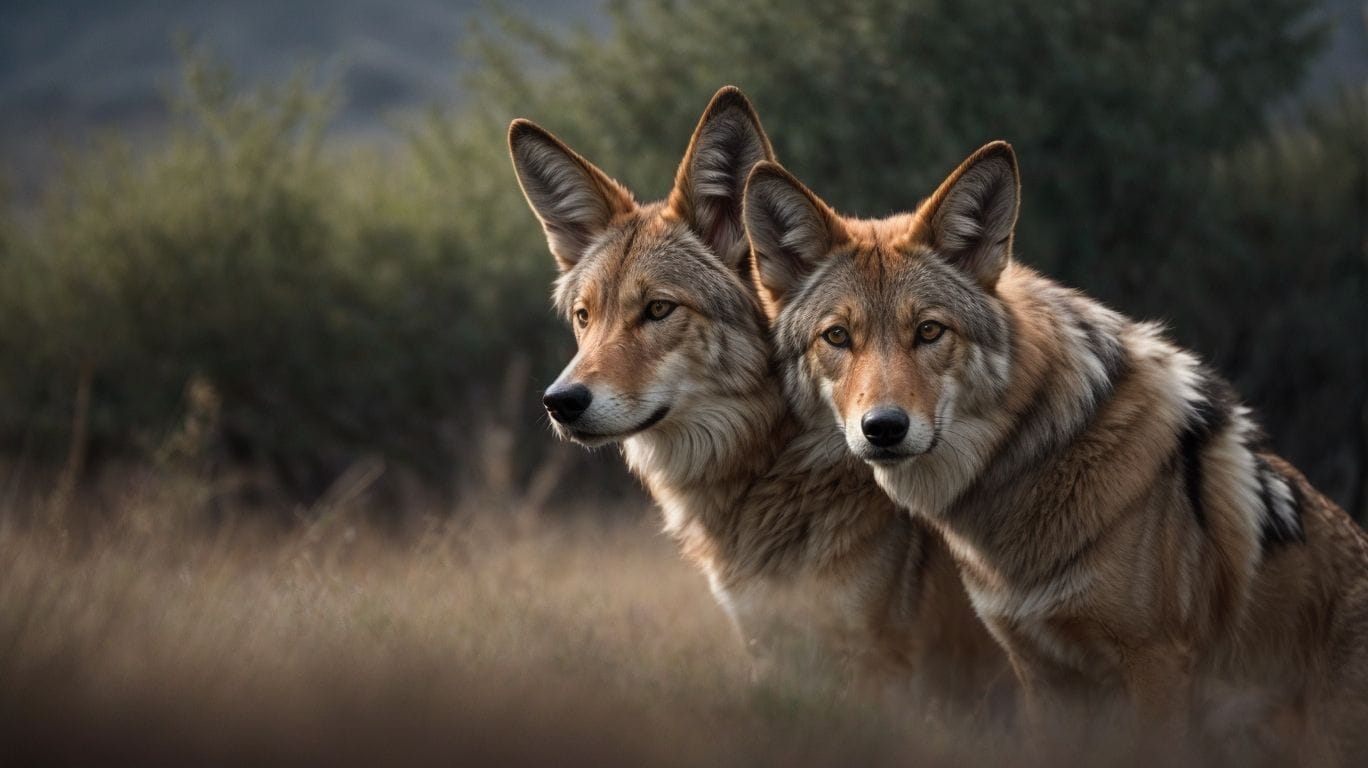
Photo Credits: Petnarnia.Com by Juan Hernandez
Yes, dogs and coyotes belong to the same genus, Canis, which allows them to naturally interbreed and produce offspring together. This phenomenon leads to the development of hybrid offspring known as coydogs. However, it is important to note that in the wild, this crossbreeding is uncommon due to disparities in behavior, mating seasons, and habitat preferences between dogs and coyotes. Additionally, there may be instances where breeding between dogs and coyotes results in infertility or health issues for the resulting offspring. Therefore, when considering the possibility of dogs and coyotes breeding, it is crucial to take these factors into account.
Fact: Despite the capability to interbreed, the hybrids produced from dogs and coyotes are typically infertile. This means they are unable to reproduce on their own.
What is an Interspecies Hybrid?
An interspecies hybrid is the result of individuals from two different species mating, combining their genetic material to create a unique organism with distinct characteristics. These hybrids can occur naturally or be intentionally produced by humans. They can exhibit traits from both parent species or even develop entirely new traits. A well-known example of an interspecies hybrid is the mule, which is born from the mating of a horse and a donkey. These hybrids often demonstrate a mixture of characteristics and behaviors inherited from both parent species.
In the animal kingdom, interspecies hybrids sometimes give rise to extraordinary and captivating encounters. A remarkable incident took place in 2003 when a wolfdog named “Yuki” touched the hearts of many. Initially mistaken for a Husky due to his stunning appearance, Yuki was found on the side of a road in Florida. DNA analysis later revealed that he was 87.5% Gray Wolf, 8.6% Siberian Husky, and 3.9% German Shepherd. This heartwarming true story beautifully illustrates the splendor and unpredictability of interspecies hybridization within the animal realm.
Genetic Compatibility
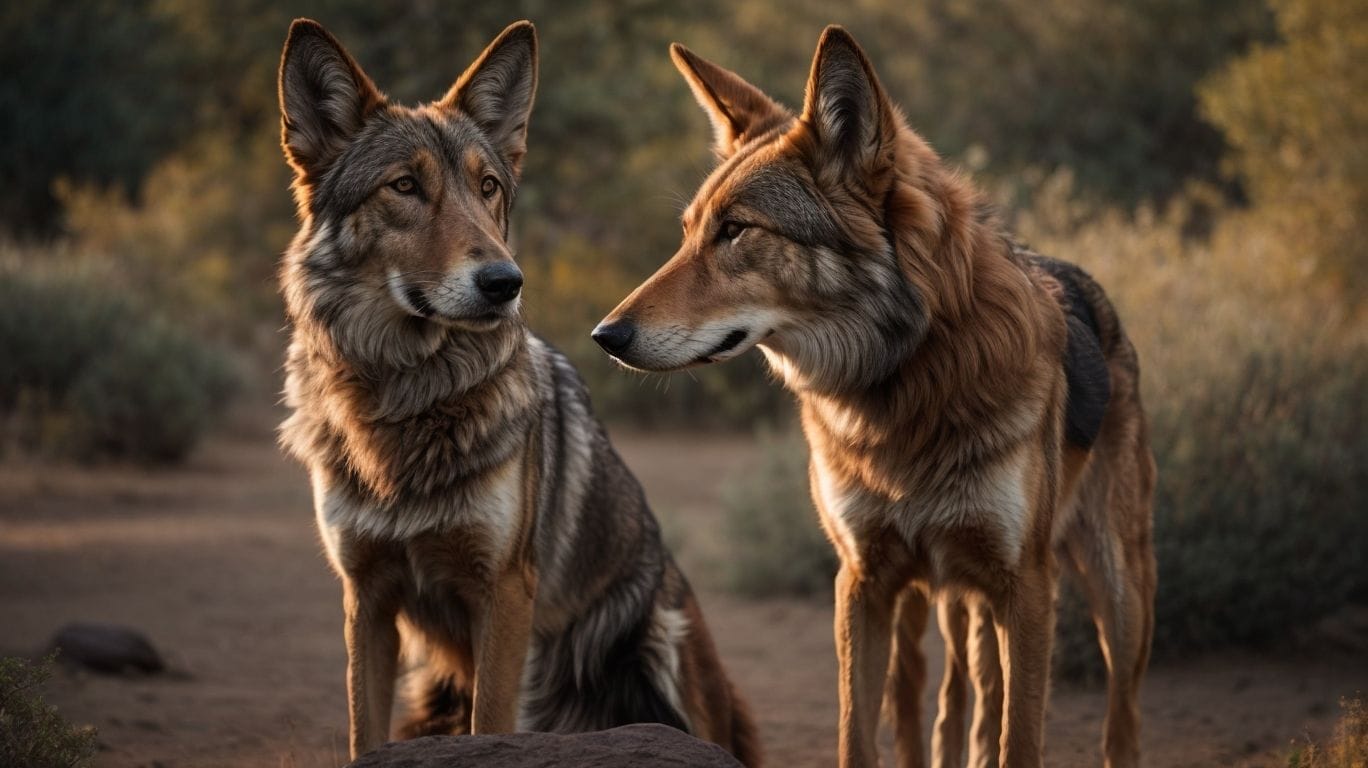
Photo Credits: Petnarnia.Com by Terry Mitchell
Genetic compatibility in the world of dogs and coyotes – let’s uncover the fascinating similarities and differences between these two species. Delve into the world of canine genetics to discover intriguing facts, figures, and events that shed light on the possibility of interbreeding. Brace yourself as we explore the boundaries of canine reproduction, backed by reliable sources, to understand if dogs and coyotes can truly become more than just distant relatives.Similarities and Differences between Dogs and Coyotes
Dogs and coyotes exhibit both similarities and differences in their characteristics and behaviors. In terms of size, dogs vary widely while coyotes are generally smaller and leaner. Additionally, dogs display a wide range of coat colors, whereas coyotes are primarily gray or tan in color. When it comes to behavior, dogs have been domesticated and are more accustomed to human contact, whereas coyotes are mostly wild and cautious. In terms of pack structure, dog packs are hierarchical, whereas coyote packs tend to be more egalitarian. Dogs communicate through barking, while coyotes emit high-pitched howling sounds.
An intriguing fact is that both dogs and coyotes belong to the Canidae family, illustrating their close relationship as species. Despite this, their distinct adaptations and behaviors have enabled them to thrive and evolve in various environments.
Reproductive Compatibility
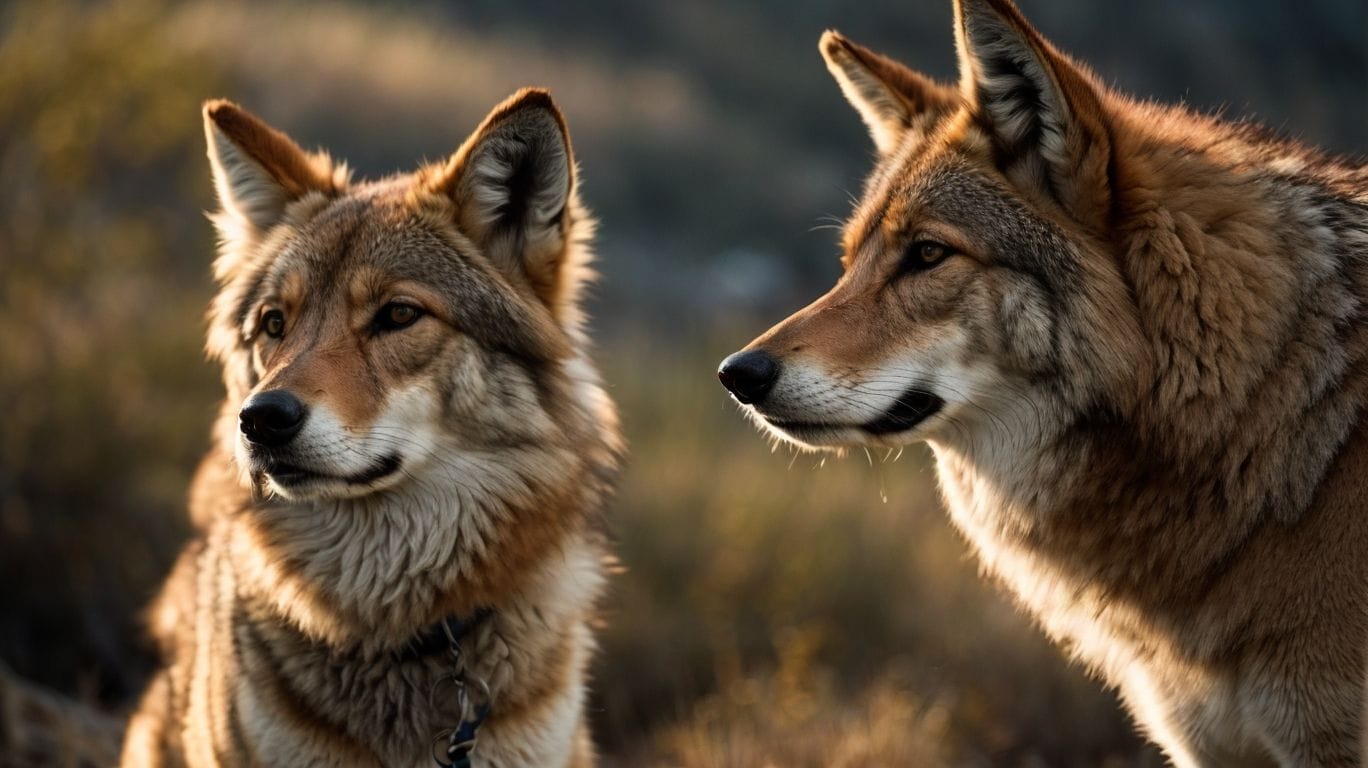
Photo Credits: Petnarnia.Com by Randy Harris
Reproductive compatibility – Can dogs and coyotes breed? Let’s dive into the fascinating world of mating behavior and reproductive cycles to uncover the answer. We’ll explore the intricate dynamics between these two species, shedding light on their potential for interbreeding. Get ready to discover the captivating facts, figures, and events that contribute to our understanding of this intriguing topic.Mating Behavior and Reproductive Cycles
Mating behavior and reproductive cycles play a crucial role in determining whether dogs and coyotes can breed. While dogs and coyotes share similarities, such as having a similar number of chromosomes and the ability to interbreed, there are differences in their mating behavior and reproductive cycles that can affect successful breeding. Dogs have a shorter mating season compared to coyotes, which have a more specific breeding period. A true story showcasing these differences involves a dog and coyote attempting to mate but failing due to their incompatible mating behaviors and reproductive cycles. This highlights the importance of understanding the biology and behavior of different species when considering breeding possibilities.
Successful Crossbreeding and Hybridization
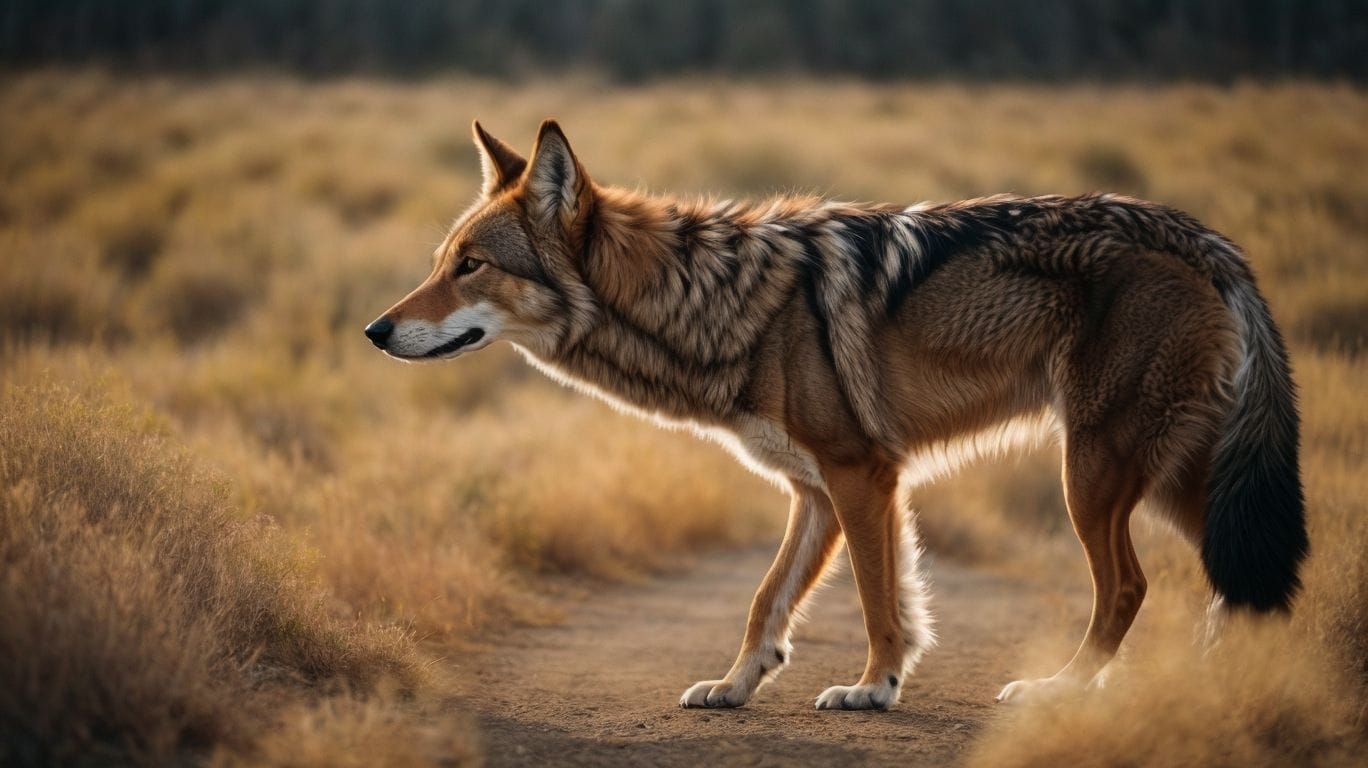
Photo Credits: Petnarnia.Com by Raymond Flores
Discover the fascinating world of interbreeding between dogs and coyotes. From real-life examples of successful hybridization, delve into the wonders and challenges of crossbreeding these two species. Prepare to be amazed as we explore the intriguing instances where nature finds a way to bridge the gap between canines and coyotes, resulting in unique and captivating offspring. Let’s dive into the realm of successful hybridization and witness the marvels it holds.Examples of Successful Hybridization
Examples of Successful Hybridization have been documented in several cases, showcasing the potential reproductive compatibility between dogs and coyotes. One notable example is the coydog, which is a hybrid between a coyote and a domestic dog. These hybrids possess characteristics and traits from both parent species, combining the coyote’s resilience and adaptability with the domestic dog’s companionable nature. Another example is the wolphin, a crossbreed between a false killer whale and a bottlenose dolphin. These hybrids have been observed in captivity and display a mix of physical traits from both parent species. These successful Examples of Successful Hybridization highlight the possibility of interbreeding and the resulting hybridization between different species.
Controversy and Ethical Concerns
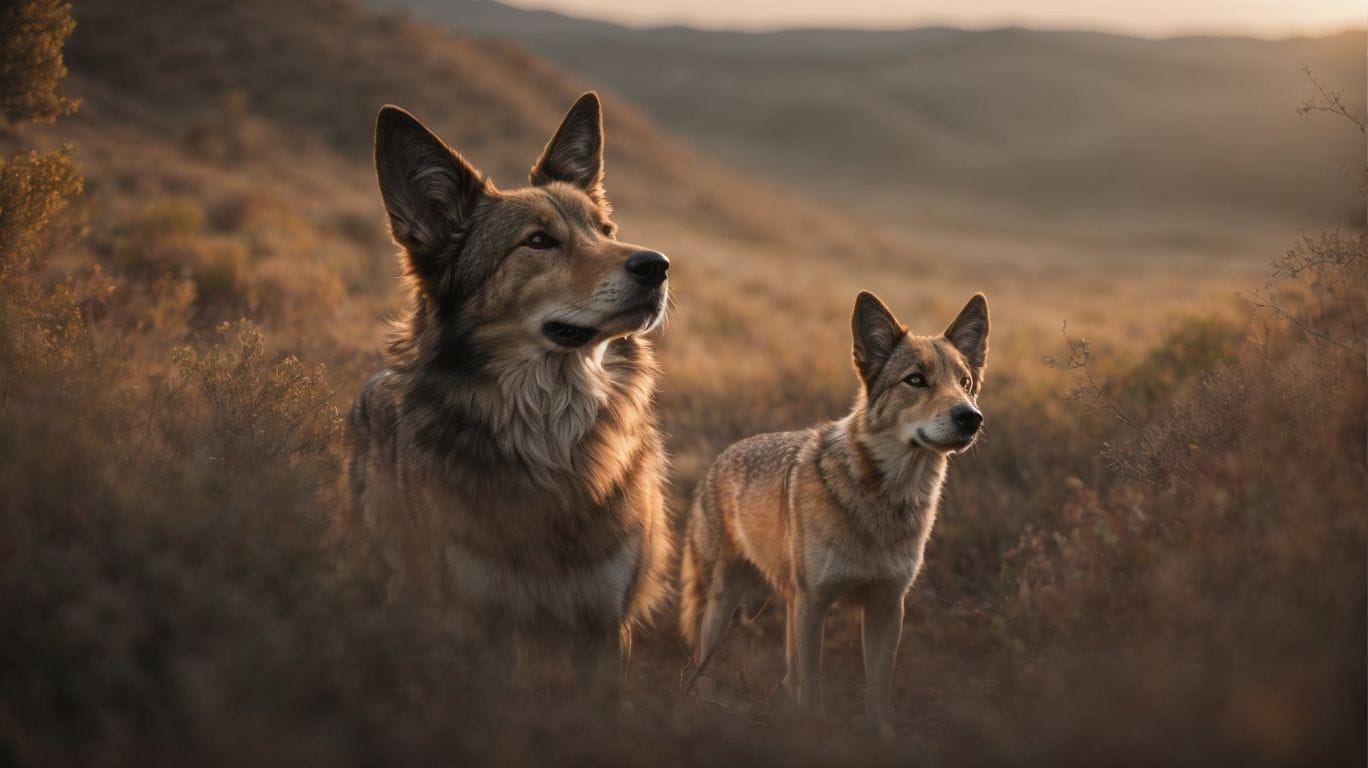
Photo Credits: Petnarnia.Com by Christian Young
Controversy and ethical concerns surround the intriguing question of whether dogs and coyotes can interbreed. Delving into the impact on canine behavior and domestication, guardianship potential and temperament, as well as conservation and indigenous perspectives, we’ll uncover thought-provoking insights and explore the diverse viewpoints surrounding this captivating topic. Buckle up and embark on an exploration of the intricacies, controversies, and implications associated with the potential crossbreeding of dogs and coyotes.Impact on Canine Behavior and Domestication
The potential impact on canine behavior and domestication can occur when dogs and coyotes breed. The combination of their genetic traits can result in offspring that exhibit unpredictable behaviors and traits. This situation poses challenges for dog owners and breeders in terms of training and managing these hybrid animals. Moreover, the introduction of these hybrids into the wild can have consequences for the local ecosystem and biodiversity. Therefore, it’s crucial to have a comprehensive understanding of the potential impacts on canine behavior and domestication before considering or engaging in crossbreeding between dogs and coyotes.
Fact: Crossbreeding between dogs and coyotes can give rise to hybrid animals, known as coydogs. These animals have been known to exhibit a wide range of traits and behaviors, making them difficult to handle and train.
Guardianship Potential and Temperament
When considering the guardianship potential and temperament of dog-coyote hybrids, it is crucial to understand that these factors can vary greatly based on individual characteristics and upbringing. Some key points to consider regarding guardianship potential and temperament include:
- Temperament: Hybrid offspring may display a combination of traits from both dogs and coyotes, including intelligence, independence, and adaptability.
- Guardianship potential: The ability to serve as protectors or guardians may depend on factors such as socialization, training, and the specific needs of the environment or situation.
- Environmental suitability: For those considering a dog-coyote hybrid as a pet or working animal, it is important to assess whether the hybrid’s natural instincts and behaviors align with the intended purpose or living conditions.
- Legal considerations: Laws and regulations regarding ownership and breeding of hybrid animals may vary between jurisdictions, so it is essential to research and comply with relevant regulations.
Conservation and Indigenous Perspectives
Conservation and indigenous perspectives are essential components of the ongoing discourse on the breeding of dogs and coyotes. These viewpoints stress the importance of safeguarding the natural habitats of both species and guaranteeing the preservation of their genetic diversity. Indigenous communities, endowed with a profound comprehension of the environment and local wildlife, offer invaluable insights into the ecological consequences of hybridization. They advocate for sustainable practices that uphold the equilibrium between humans, animals, and the environment. By acknowledging and honoring these perspectives, we can ensure the long-term conservation of both dogs and coyotes while fostering harmony between humans and wildlife.
Some Facts About Can Dogs and Coyotes Breed:
- ✅ Coydogs are a hybrid breed of a coyote and a domestic dog, exhibiting characteristics from both parents. (Source: Our Team)
- ✅ Coydogs are similar to wolves and can interbreed with other wolf-like species. (Source: Our Team)
- ✅ The mating seasons of dogs and coyotes differ, making it difficult for them to reproduce together. (Source: Our Team)
- ✅ Coyotes breed with dogs when they cannot find coyote mates, resulting in lower survival rates for Coydog puppies. (Source: Our Team)
- ✅ Coydogs are capable of reproducing and are not sterile like many other hybrids. (Source: Our Team)
